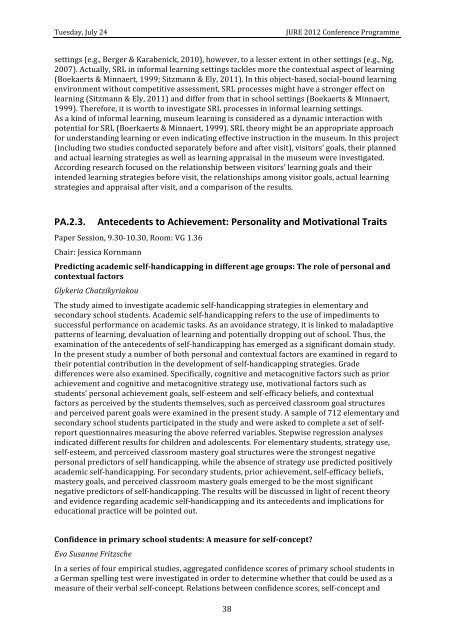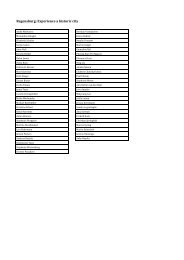JURE 2012 Programme book - EARLI Jure 2012
JURE 2012 Programme book - EARLI Jure 2012
JURE 2012 Programme book - EARLI Jure 2012
Create successful ePaper yourself
Turn your PDF publications into a flip-book with our unique Google optimized e-Paper software.
Tuesday, July 24 <strong>JURE</strong> <strong>2012</strong> Conference <strong>Programme</strong><br />
settings (e.g., Berger & Karabenick, 2010), however, to a lesser extent in other settings (e.g., Ng,<br />
2007). Actually, SRL in informal learning settings tackles more the contextual aspect of learning<br />
(Boekaerts & Minnaert, 1999; Sitzmann & Ely, 2011). In this object-‐based, social-‐bound learning<br />
environment without competitive assessment, SRL processes might have a stronger effect on<br />
learning (Sitzmann & Ely, 2011) and differ from that in school settings (Boekaerts & Minnaert,<br />
1999). Therefore, it is worth to investigate SRL processes in informal learning settings.<br />
As a kind of informal learning, museum learning is considered as a dynamic interaction with<br />
potential for SRL (Boerkaerts & Minnaert, 1999). SRL theory might be an appropriate approach<br />
for understanding learning or even indicating effective instruction in the museum. In this project<br />
(including two studies conducted separately before and after visit), visitors’ goals, their planned<br />
and actual learning strategies as well as learning appraisal in the museum were investigated.<br />
According research focused on the relationship between visitors’ learning goals and their<br />
intended learning strategies before visit, the relationships among visitor goals, actual learning<br />
strategies and appraisal after visit, and a comparison of the results.<br />
PA.2.3. Antecedents to Achievement: Personality and Motivational Traits<br />
Paper Session, 9.30-‐10.30, Room: VG 1.36<br />
Chair: Jessica Kornmann<br />
Predicting academic self-‐handicapping in different age groups: The role of personal and<br />
contextual factors<br />
Glykeria Chatzikyriakou<br />
The study aimed to investigate academic self-‐handicapping strategies in elementary and<br />
secondary school students. Academic self-‐handicapping refers to the use of impediments to<br />
successful performance on academic tasks. As an avoidance strategy, it is linked to maladaptive<br />
patterns of learning, devaluation of learning and potentially dropping out of school. Thus, the<br />
examination of the antecedents of self-‐handicapping has emerged as a significant domain study.<br />
In the present study a number of both personal and contextual factors are examined in regard to<br />
their potential contribution in the development of self-‐handicapping strategies. Grade<br />
differences were also examined. Specifically, cognitive and metacognitive factors such as prior<br />
achievement and cognitive and metacognitive strategy use, motivational factors such as<br />
students’ personal achievement goals, self-‐esteem and self-‐efficacy beliefs, and contextual<br />
factors as perceived by the students themselves, such as perceived classroom goal structures<br />
and perceived parent goals were examined in the present study. A sample of 712 elementary and<br />
secondary school students participated in the study and were asked to complete a set of self-‐<br />
report questionnaires measuring the above referred variables. Stepwise regression analyses<br />
indicated different results for children and adolescents. For elementary students, strategy use,<br />
self-‐esteem, and perceived classroom mastery goal structures were the strongest negative<br />
personal predictors of self handicapping, while the absence of strategy use predicted positively<br />
academic self-‐handicapping. For secondary students, prior achievement, self-‐efficacy beliefs,<br />
mastery goals, and perceived classroom mastery goals emerged to be the most significant<br />
negative predictors of self-‐handicapping. The results will be discussed in light of recent theory<br />
and evidence regarding academic self-‐handicapping and its antecedents and implications for<br />
educational practice will be pointed out.<br />
Confidence in primary school students: A measure for self-‐concept?<br />
Eva Susanne Fritzsche<br />
In a series of four empirical studies, aggregated confidence scores of primary school students in<br />
a German spelling test were investigated in order to determine whether that could be used as a<br />
measure of their verbal self-‐concept. Relations between confidence scores, self-‐concept and<br />
38



